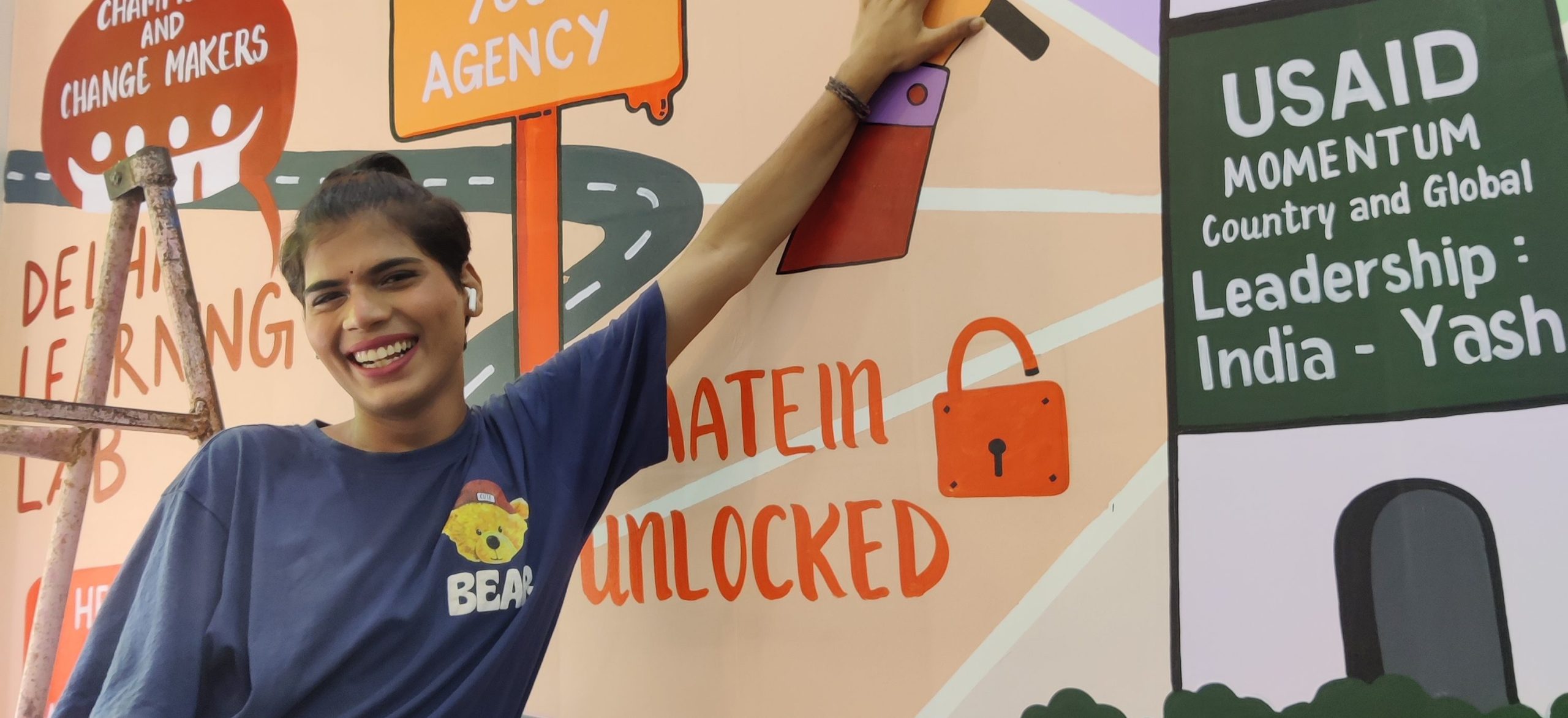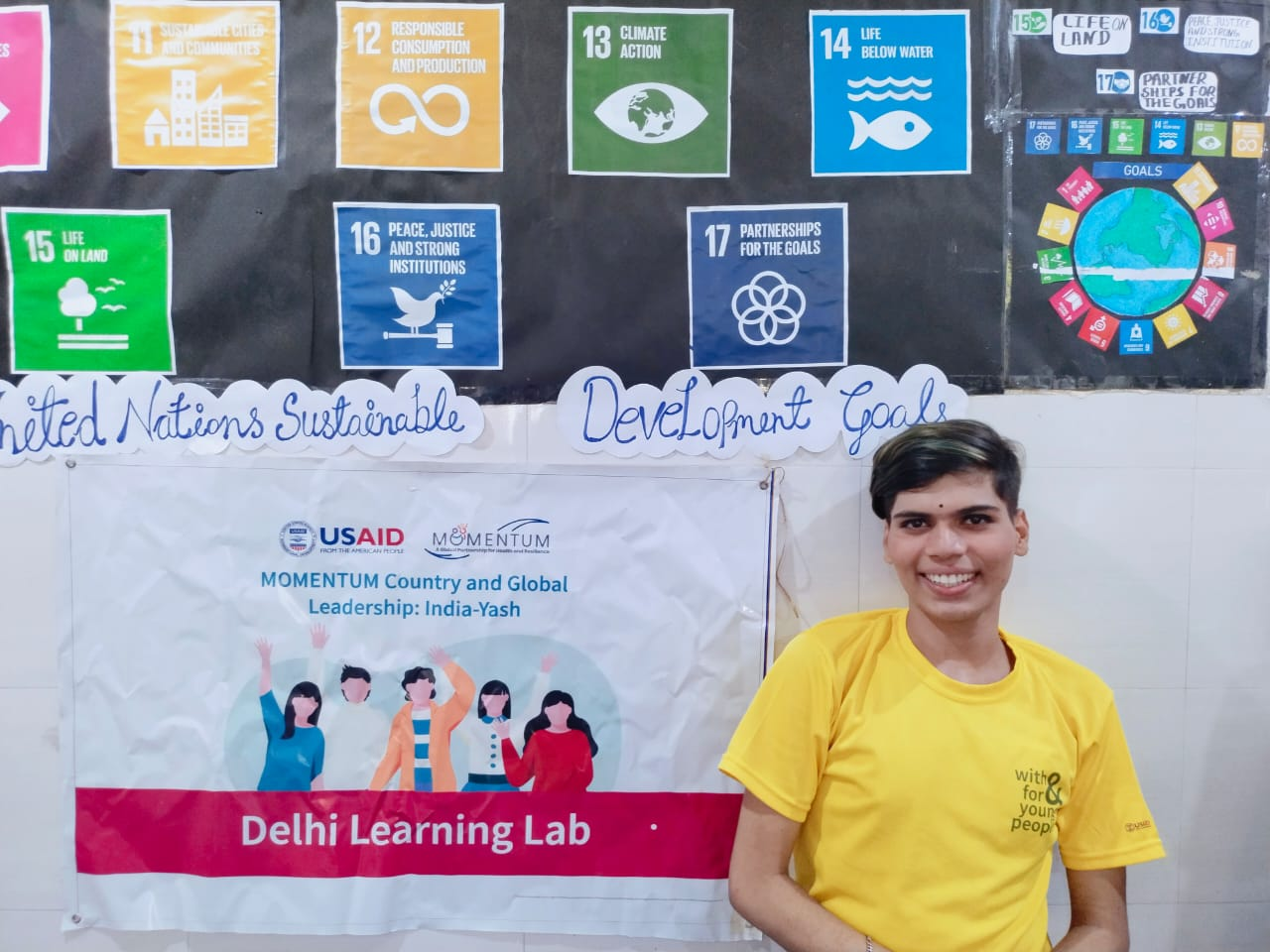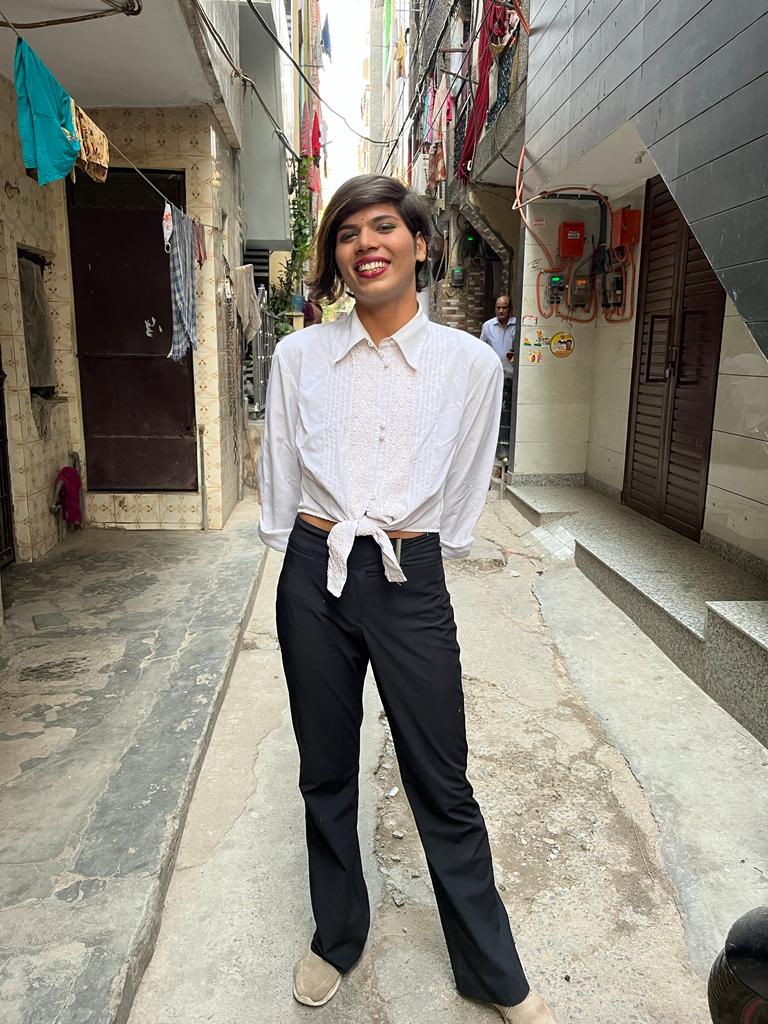Creating Safe Spaces: The Story of Pihu, Youth Champion for Sexual and Reproductive Health in India
Published on December 20, 2023

By Astha Jain, Communication Officer, MOMENTUM Country and Global Leadership: India-Yash, Jhpiego
Born and raised in Delhi by a single mother, Pihu – who now identifies as transgender non-binary – knew she was different from other boys at a young age. She was harassed and teased by her schoolmates, community members, and relatives throughout her childhood when they saw she loved playing with dolls.
At 13, she confided in her mother and grandmother about her preference for men as romantic partners, and they accepted her. However, her extended family was less accepting, and she faced violence from her maternal uncle, who beat her almost to death. With the support of her grandmother, she began feeling comfortable expressing her gender-non-conforming choices.
Despite these challenges, Pihu remained determined to build the future she wanted. In an urban slum where traditions and norms seemed rigid, she dared to challenge the status quo and stand up for the rights and dignity of her community. A courageous advocate for LGBTQIA+ (lesbian, gay, bisexual, transgender, queer or questioning, intersex, asexual, and more) rights, she displayed unwavering determination to create a more inclusive and accepting environment for everyone, regardless of their sexual orientation or gender identity.
Through a mentor, she learned about the Delhi Learning Lab (DLL)—an initiative supported by MOMENTUM Country and Global Leadership: India-Yash project—located in a low-resource community, Dakshinpuri, in New Delhi.
Pihu connected with DLL and, at 19, is now pursuing a bachelor’s in science and actively working for the LGBTQIA+ community through the lab, which:
- Provides an inclusive and safe place where young people can come together, talk, and share information about their sexual and reproductive health (SRH).
- Combines the multiple youth-friendly health initiatives that MOMENTUM India-Yash supports into one site to better understand and measure the overall impact of the project’s efforts to improve the well-being of young people in India.

Young people between the ages of 15 and 29 make up more than 27.5% of India’s population—yet this large group remains underserved regarding their sexual and reproductive (SRH) needs. India is also a complex landscape where traditional norms and values often clash with the rights and identities of LGBTQIA+ individuals. These communities have historically been stigmatized and marginalized, and LGBTQIA+ individuals often face discrimination, violence, and social exclusion. Promoting SRH among these communities helps ensure equal access to healthcare, protects legal rights, and supports access to family planning.
MOMENTUM supports the family planning and reproductive health needs of India’s vulnerable youth, including LGBTQIA+ youth, in urban and rural areas, of five states in India: Assam, Jharkhand, Odisha, Chhattisgarh, and Madhya Pradesh. The project’s interventions are varied and include improving knowledge of and access to youth-friendly SRH services, as well as supporting an overall environment where youth-friendly health services can flourish.
As a linchpin of its efforts, MOMENTUM set up the Delhi Learning Lab (DLL) which, in addition to being an inclusive space for youth discussions, is creating comprehensive education courses for young people to learn about SRH, gender equity, advocacy, and campaigns. MOMENTUM’s DLL Youth Champions, like Pihu, foster meaningful engagement between youth and the community. They identify and engage with stakeholders—private and public SRH service providers, faith-based leaders, colleges, and relevant government authorities—to facilitate easy access to youth-friendly, quality SRH information and services for young people.
As a Youth Champion, Pihu reaches out to young people from the LGBTQIA+ community, generating awareness, and sensitizing them on their SRH and other rights.
 “I aspire to transform the societal perception of the LGBTQIA+ community, acknowledging their inherent right to lead a life of dignity and respect,” explains Pihu. “I appreciate that the lab is youth-led and caters to the needs of young individuals, offering a secure environment where I can freely express myself in the workplace. Empowered by this nurturing environment, I seek to establish similar safe spaces and extend support to other members of the queer community,” says Pihu. She recently led a Pride Day event at the Youth Resource Center, supporting the sexual and reproductive health rights of youth by bringing together organizations and community members to celebrate and advocate for the rights of the queer community.
“I aspire to transform the societal perception of the LGBTQIA+ community, acknowledging their inherent right to lead a life of dignity and respect,” explains Pihu. “I appreciate that the lab is youth-led and caters to the needs of young individuals, offering a secure environment where I can freely express myself in the workplace. Empowered by this nurturing environment, I seek to establish similar safe spaces and extend support to other members of the queer community,” says Pihu. She recently led a Pride Day event at the Youth Resource Center, supporting the sexual and reproductive health rights of youth by bringing together organizations and community members to celebrate and advocate for the rights of the queer community.
“Young individuals act as catalysts for change, breaking the cycle of long-standing societal norms and stereotypes that have persisted for generations,” says Pihu. “My vision is for a future where young people reside in gender-sensitive, secure environments and can openly share their joyful coming-out experiences.”
Pihu’s story is a testament to the power of youth activism and the impact that one person can have in the fight for SRH rights. Youth Champions like Pihu are at the front lines of change and are advancing the global agenda of health equity and youth leadership.

